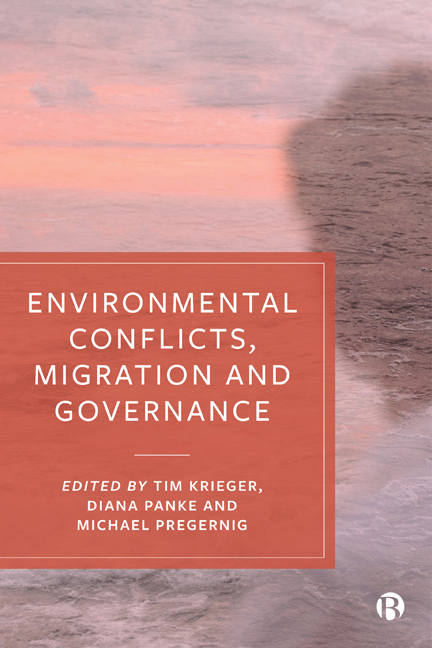Book contents
- Frontmatter
- Contents
- List of Figures and Tables
- List of Acronyms
- Notes on Contributors
- Acknowledgements
- 1 Environmental and Resource-Related Conflicts, Migration and Governance
- 2 Renewable Resource Scarcity, Conflicts and Migration
- 3 Extractive Resources, Conflicts and Migration
- 4 Climate Change, Conflicts and Migration
- 5 The Individual Level: Selection Effects
- 6 The Individual Level: Sorting Effects
- 7 Migration Governance at the State Level: Policy Developments and Effects
- 8 Environmental Migration Governance at the Regional Level
- 9 Migration Governance at the Global Level: Intergovernmental Organizations and Environmental Change-Induced Migration
- 10 The Link between Forced Migration and Conflict
- 11 Conflict-Prone Minerals, Forced Migration and Norm Dynamics in the Kimberley Process and ICGLR
- 12 On the Nexus Between Environmental Conflict, Migration and Governance: Concluding Remarks
- Index
1 - Environmental and Resource-Related Conflicts, Migration and Governance
- Frontmatter
- Contents
- List of Figures and Tables
- List of Acronyms
- Notes on Contributors
- Acknowledgements
- 1 Environmental and Resource-Related Conflicts, Migration and Governance
- 2 Renewable Resource Scarcity, Conflicts and Migration
- 3 Extractive Resources, Conflicts and Migration
- 4 Climate Change, Conflicts and Migration
- 5 The Individual Level: Selection Effects
- 6 The Individual Level: Sorting Effects
- 7 Migration Governance at the State Level: Policy Developments and Effects
- 8 Environmental Migration Governance at the Regional Level
- 9 Migration Governance at the Global Level: Intergovernmental Organizations and Environmental Change-Induced Migration
- 10 The Link between Forced Migration and Conflict
- 11 Conflict-Prone Minerals, Forced Migration and Norm Dynamics in the Kimberley Process and ICGLR
- 12 On the Nexus Between Environmental Conflict, Migration and Governance: Concluding Remarks
- Index
Summary
Introduction
The current era of globalization is characterized by a high degree of interconnectedness across borders and continents, which has become possible through cost-decreasing innovations in and the spread of technologies of communication and transport (Boyer and Drache, 1996; Perkmann and Sum, 2002; Baylis et al, 2011). The phenomenon ‘globalization’ goes hand in hand not only with significant levels of international and regional trade and foreign direct investments (Boyer and Drache, 1996; Hirst and Thompson, 1996) but also with significant numbers of migrants, including labour migrants and refugees (Piper and Grugel, 2015). These migrants are yet another source of very specific interdependencies between countries, especially when conflicts and migration interact. The relationship between conflicts and migration is complex. Conflicts can induce migration, but do not have to, since not everyone leaves a country of origin. Also, not every potential host country is equally open to migrants as countries differ in their migration governance approaches. Moreover, migration can but does not have to bring about a series of different unintended consequences in the countries of origin (for example, ‘brain drain’) and the host countries (for example, social conflicts).
While many of these interdependencies have been explored in the literature, a link that is not yet sufficiently understood relates to the interdependencies between environmental or resource-related conflicts and migration as well as the role of governance in this respect. Therefore, the interdependencies between environmental and resource-related conflicts and migration and the related governance challenges form the core topic of this volume. More specifically, this book examines how environmental and resource conflicts, such as desertification or conflicts arising over scarce (extractive) resources trigger migration; how migration and conflicts are politically regulated in national, regional and international governance arrangements; how individual selection and sorting play out in this constellation; and how migration feeds back into countries of origin as well as host countries.
- Type
- Chapter
- Information
- Environmental Conflicts, Migration and Governance , pp. 1 - 16Publisher: Bristol University PressPrint publication year: 2020



